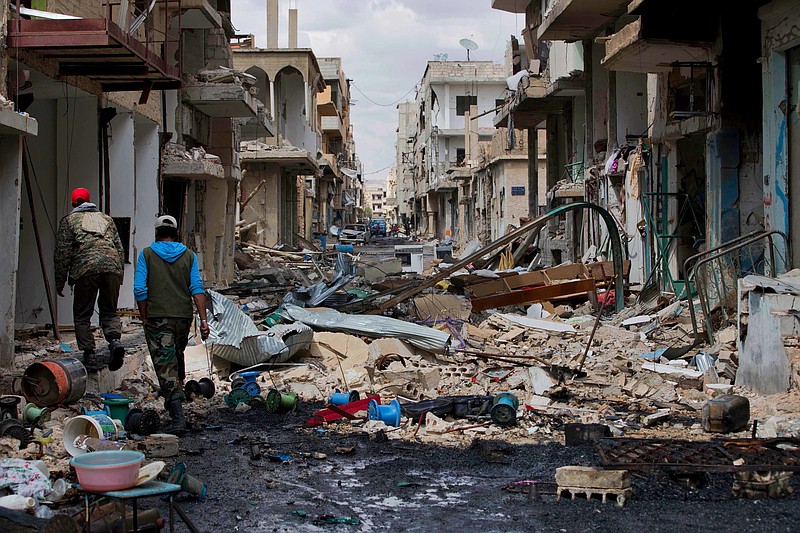If you go
Who: Bassam Issa, president of the Islamic Center of Greater Chattanooga; Rabbi Susan Tendler of B’nai Zion Congregation; and Rev. Charles Ensminger, minister at Harrison United Methodist ChurchWhat: Forum on the Religions of AbrahamWhen: Wednesday at 7-8:30 p.m.Where: Brainerd United Methodist Church, 4315 Brainerd Road
Hate comes easily.
The other options are more complicated, more messy and more time-consuming.
So we hate what we fear, what we don't know, what we find different. And, not surprisingly, we wind up with a world where Christians, Jews and Muslims too often practice radical politicized religion.
But what if adherents of Christianity, Judaism and Islam took a collective deep breath and considered that the God of our faiths wants nothing to do with such religions.
That's what Rabbi Jonathan Sacks maintains in his book "Not in God's Name: Confronting Religious Violence," which will be the subject of discussion at a forum on Wednesday night.
The forum features three panelists representing the three great religions. Each of the three will make opening remarks, answer the same three questions (on sacred texts, the afterlife and how the religions view each other), and then answer previously submitted questions from the audience.
Panelist Bassam Issa, president of the Islamic Center of Greater Chattanooga, has been on similar panels locally since the 9/11 terror attacks in New York City. Fortunately, his job as a developer allows him the freedom to be a part of such events, he said, because they're important.
"I'm speaking on behalf of me as a Muslim," he said. "I can't claim to speak for every Muslim but as I understand Islam to be."
Yet, Issa said, because he has studied the Quran in its original Arabic, because he understands it, because he knows what its verses mean, what the derivatives of its words are, where they came from and when they came, he is accepted as a spokesman for the center, even if individual Muslims may disagree with a particular thought he may have.
"We all worship the same God," he said. "We all pray to the creator of this universe. So Allah equals God equals the creator."
In lineage, Issa said, Christians and Jews are descendents of Abraham's son, Isaac, and Muslims are descendents of Abraham's son, Ishmael.
"If we have that," he said, "what are we fighting about?"
Panelist Rabbi Susan Tendler of B'nai Zion Congregation, who has met Sacks and often studies his teachings, said the forum and the book provide an occasion "to take a stand to claim again [what] is holy and, perhaps by taking a united stand, ensure it is even holier."
"It's an opportunity for us learn more about one another and respect one another for our belief systems and our values," she said, "and see how much really binds us and then take a united stand to promote those core universal values in the world today."
Indeed, said the Rev. Charles Ensminger, a panelist and minister at Harrison United Methodist Church, adherents of the three religions often have more alike than different.
"With individuals," he said, "when we focus on what makes us different, when we see each other as foreign, as 'other,' we can't have a conversation." When people view each other as the same, "we've all got experiences. We get through life [with] its struggles, its joys. When we focus on commonalities, we can overcome the tendency to react in violence, in anger.
"It takes time, but it works. Learning to live in community takes effort."
The Rev. Dr. Dennis Flaugher, senior minister of Brainerd Church and moderator of the upcoming forum with Hamilton County prosecutor Boyd Patterson, said Sacks' book points out "that the gift of monotheistic religion centers on the belief of one God who creates all life as sacred," that common ancestor Abraham didn't lead an empire and didn't conquer with an army, and that he lived to be a blessing to others regardless of their faith.
The message for all three religions, he said, is to "say what they failed to say in the past - that we're all children of Abraham, that we're all precious in the sight of God, that we are blessed and no one has to be cursed, that we are called to let go of hate and be a blessing to others, that we are to be honoring God's name by honoring his image, [which is] humankind."
While the messages of the book are timeless and as wide as the reach of the three faiths, the panelists said the messages also speak to the here and now.
Tendler noted their need in a presidential race with "such a lack of civility" and in the "different terror" Chattanoogans have faced with the spate of gun violence in the last several weeks. Issa cited the understanding that was required with the local slaying of five military personnel by a young man with Muslim ties last July. And Ensminger mentioned in general "the extreme lack of effort" found in recent religious violence as opposed to the hard work of understanding and of peaceful coexistence.
One forum certainly won't remove the entire log from the eyes of those who refuse to see, but by removing one speck at a time from each of our eyes we might all see clearer.
